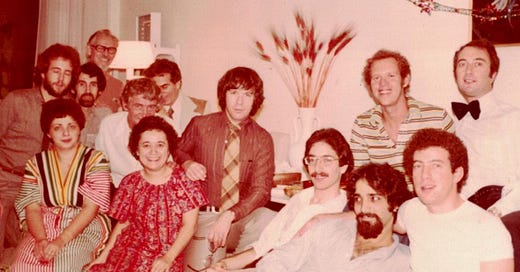This Little Zine Gave Me Such Big Feels
A queer Jewish zine launch, a little yiddish lesson, and what it means to be proud.
Last night, I took my wife out on a date to a launch party for Not Going Anywhere, a zine created by a group of young archival researchers about the history of Montreal's queer Jewish communities and organizations in the 60s through the present. My wife and I are both queer and Jewish, and we love magazines and zines (her first apartment’s walls were papered in old magazine cutouts, which was how I knew I loved her). There was no way we were staying home.
When I got the email invitation from the Jewish Museum of Montreal, I felt like all that juju about “manifesting” actually works. How often is it that you complain about missing or wanting something (see, my last post about feeling lonely in my queerness) and then that thing comes knocking on your proverbial door? Guys - I think the universe is subscribed to my substack.
The zine, which sold out at the event but is poised for another run, marks the first permanent and physical memorial of Montreal’s queer Jewish history. It’s mere existence, and all the stories it tells, are just incredible to me, as someone who felt like I had to distance myself from my city and my Jewish community at 18 to be my truest, fullest self. It was only when I went away to college that I learned that I was bisexual, but in hindsight, the signs were there. All to say, I felt on some level that I needed to hide; to exclude myself from the tightly knit fabric of Montreal’s anglo Jewish community in order to shake out my real identity.
So I can’t really put to words how deeply the story of Montreal’s first gay Jewish community organization, called Naches, struck me.
Naches is the yiddish word for “pride” or “joy”, and is usually used to refer to one’s children or grandchildren. For a queer Jewish organization to name itself that is incredibly powerful. When you think of the shame and pain that so many families inflict on their queer children, either by asking them to hide that part of themselves, or rejecting them or their queer identity entirely, Naches feels like a homecoming. The name of the organization itself is a safe haven for people who likely have been rejected by their own parents or grandparents to some extent. It’s like the whole name of the organization is saying to queer Jewish children: “We don’t just accept or tolerate you, but we are PROUD of who you are. Your identity, your whole self, brings us joy. Come join us at home, where you belong.”
Naches sounds like so much fun: they hosted parties and Jewish holidays, but they also did educational outreach and political work. They even took the YMCA to the Quebec Human Rights Commission and won! (The Y wouldn’t let them rent a room for their events, and it took them 5 years to get access to the community space, which I am certain did not feel like a community space to them at all).
I have always believed in the power of writing things down so other people can read them. The writing down of this history has affirmed so much of my own existence, my own story, in a way that I haven’t experienced before.
As the Zine opens:
The LGBTQ+ relationship to history is a queer thing. Traditionally erased or purposefully redacted, queer histories have been typically kept alive through whisper networks and, since mid-20th century, communal archives. But now, queer memory can aid us to right historical wrongs, document oral histories, give life to dust-covered boxes lying dormant on fonds shelves.
History allows us to reckon with our origins and grapple with what came before us. We can make sense of the present, and be part of the betterment of life in the present day. In Judaism it is organized in religious scripture, recounted in ceremonies, teachings, and cultural events – the very fabric of life. For a people whose existence has been in peril since nearly the beginning of their time, history has been our means to survive.
–From Introduction, Not Going Anywhere: History and Continuity in Queer Jewish Montreal
Being in a room last night with a bunch of people whose identities were close to mine and my wife’s was nourishing. It was affirming. It felt like — I don’t know. It felt like coming home to a house that wanted us there.
Do you want a zine? I am sure you do. You can email one of the editor, Benya Villani, at benya@imjm.ca and request a copy of the next run.




